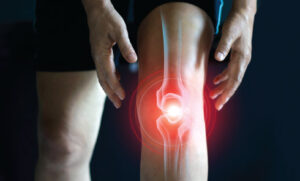By: Regenexx at Gold Coast Orthopedics, Regenerative Medicine
 Knee arthritis affects more Americans than any other joint disorder in the United States. By age 60, an estimated 10 percent of men and 13 percent of women have knee arthritis. Knee arthritis and chronic knee pain often mean that you have to avoid the activities you love (from hiking to dancing to chasing the grandchildren), relying on over-the-counter pain medications, toxic steroid injections, dangerous narcotics, knee arthroscopy (which increases the likelihood of a knee replacement down the line), and knee replacement surgery. But new advancements in precise image-guide injections using bone marrow concentrate containing your own stem cells offer hope, healing, and pain relief for arthritis of the knee.
Knee arthritis affects more Americans than any other joint disorder in the United States. By age 60, an estimated 10 percent of men and 13 percent of women have knee arthritis. Knee arthritis and chronic knee pain often mean that you have to avoid the activities you love (from hiking to dancing to chasing the grandchildren), relying on over-the-counter pain medications, toxic steroid injections, dangerous narcotics, knee arthroscopy (which increases the likelihood of a knee replacement down the line), and knee replacement surgery. But new advancements in precise image-guide injections using bone marrow concentrate containing your own stem cells offer hope, healing, and pain relief for arthritis of the knee.
Symptoms and Treatments: How is Knee Arthritis Identified and Cured?
Arthritis of the knee, as with arthritis anywhere else in your body, is the result of chronic inflammation in your joints resulting in deterioration and degeneration of the structures in the knee. Common symptoms for knee arthritis include:
Swelling and tenderness in your knee especially after activity.
Unstable knee. Over time, ligaments can weaken and result in instability in your knee. This can cause a buckling sensation when you put weight on it.
Poor, limited range of motion in your knee when doing everyday activities, such as sitting, standing, and walking.
If your doctor diagnoses you with knee arthritis, he or she may recommend a combination of medical interventions and lifestyle modifications. These may include:
Low-impact exercise/Physical Therapy
Losing weight if you’re overweight
Other treatments such as: Acupuncture, natural topical creams, and ice packs
Common medical interventions often start with taking over-the-counter pain medications like aspirin, ibuprofen, and other nonsteroidal anti-inflammatory drugs (NSAIDs). NSAIDs can temporarily help pain associated with arthritis but can lead to damage in the heart, kidneys, and Gl tract over the long term (and sometimes even in the short-term) and do not improve long-term pain. More serious medical approaches often graduate to:Prescription pain drugs
Injections, such as corticosteroid injections to temporarily reduce pain
Surgery
Are Corticosteroid injections Helpful For Knee Arthritis?
Your doctor may recommend corticosteroid injections for knee arthritis. Corticosteroids are powerful anti-inflammatory agents that temporarily reduce inflammation in an arthritic joint. Unfortunately, corticosteroids are also toxic to cartilage and increase the rate of arthritic progression. In a recent 2020 study from The Bone and Joint Journal, patients with knee arthritis who underwent corticosteroid injections were compared to patients with similar levels of knee arthritis who did not have any steroid injections. The patients who were given steroid injections were more than 6 times as likely to undergo a knee replacement.
While helpful for knee pain in the short term, corticosteroid injections can actually worsen knee arthritis and pain over the long term.
Is Surgery the Right Answer For Knee Pain and Knee Arthritis?
Your doctor may recommend a knee replacement, which involves removing the damaged knee joint entirely and installing an artificial knee.
In fact, arthritis is the #1 reason for people to get knee replacement surgery or hip replacement surgery.
However, most surgeons recommend joint replacement surgery be the last resort because:
Knee replacements can wear out and may need to be replaced, which is an even bigger operation than the first
There have been many “mechanical problems” and manufacturer recalls related to artificial joints
May entail a long recovery process
An artificial joint that becomes infected is a very serious complication that can lead to another joint replacement and long term IV antibiotics in the best case or can lead to leg amputation or death in more serious cases.
More than one-third of patients who have a knee replacement still have some knee pain.
Range of motion in the knee after the surgery is often reduced.
Thankfully, a growing body of research is revealing new, cutting-edge approaches to knee arthritis, with many men and women finding the relief they need through various skilled orthobiologic procedures utilizing the person’s own bone marrow concentrate, platelet rich plasma, and/or microfragmented adipose/fat tissue.
Bone Marrow Concentrate (BMAC) and Knee Arthritis
The premise is simple, yet the science is groundbreaking. Your bone marrow and blood get drawn through a patented same-day protocol, and your bone marrow concentrate, where your body’s stem cells are found in highest concentration, is processed in a specialized lab.
Then, your BMAC and natural growth factors are injected under precise image-guidance using sonographic and X-ray devices directly into multiple tissue structures in your affected knee (eg. cartilage, ligaments, tendons, bone, meniscus). This provides more cells to the injured, degenerated, and inflamed joint than your body would otherwise send to the area, resulting in significant improvements in your knee pain and knee function within just a 2-3 months.
Unfortunately, the world of stem cell treatments is often referred to by scientists as a “wild wild west.” The efficacy of “stem celTprocedures for knee arthritis and chronic knee pain means many companies have rushed to market with various health claims and procedures. Alas, many (if not most) of what you’ll find on the market – such as the use of exosomes or umbilical cord “stem cells” – isn’t backed by real research and in fact, is illegal to use.
When choosing a regenerative treatment for knee arthritis, it’s critical that you look for a procedure that’s truly backed by science, and specifically peer-reviewed randomized controlled medical trials and other clinical trials.
When reviewing the published research, the science is clear: The most advanced and effective treatment for knee arthritis is from your bone marrow concentrate (BMAC) injected into the joint and sometimes into the bone.
In one study, BMAC injections into the knee joint significantly reduced the need for knee replacement surgery. Another study tracked patients for 15 years and found that BMC injections into the bone (near the joint line) also significantly reduced the need for knee replacement.
At Regenexx, this is the exact same procedure we employ in our clinics. These advancements in regenerative medicine and technology mean our Regenexx approach, overseen by expert technicians and clinicians who have been doing this for over a decade, is far more effective than the run-of-the-mill treatments offered by other providers.
If you suffer from knee arthritis and want to avoid costly and invasive knee replacement surgery, contact us today to learn how you can use these advancements in regenerative medicine to naturally and effectively target your knee health concerns.
Regenexx
20754 W Dixie Hwy | Miami, FL 33180
786-305-5336
GoldCoastOrthopedics.com
Sister Clinic: Regenexx Tampa Bay
2401 University Pkwy, Suite 104, Sarasota, FL 34243
8600 Hidden River Pkwy, Suite 700, Tampa, FL 33637
RegenTampaBay.com
 South Florida Health and Wellness Magazine Health and Wellness Articles
South Florida Health and Wellness Magazine Health and Wellness Articles




